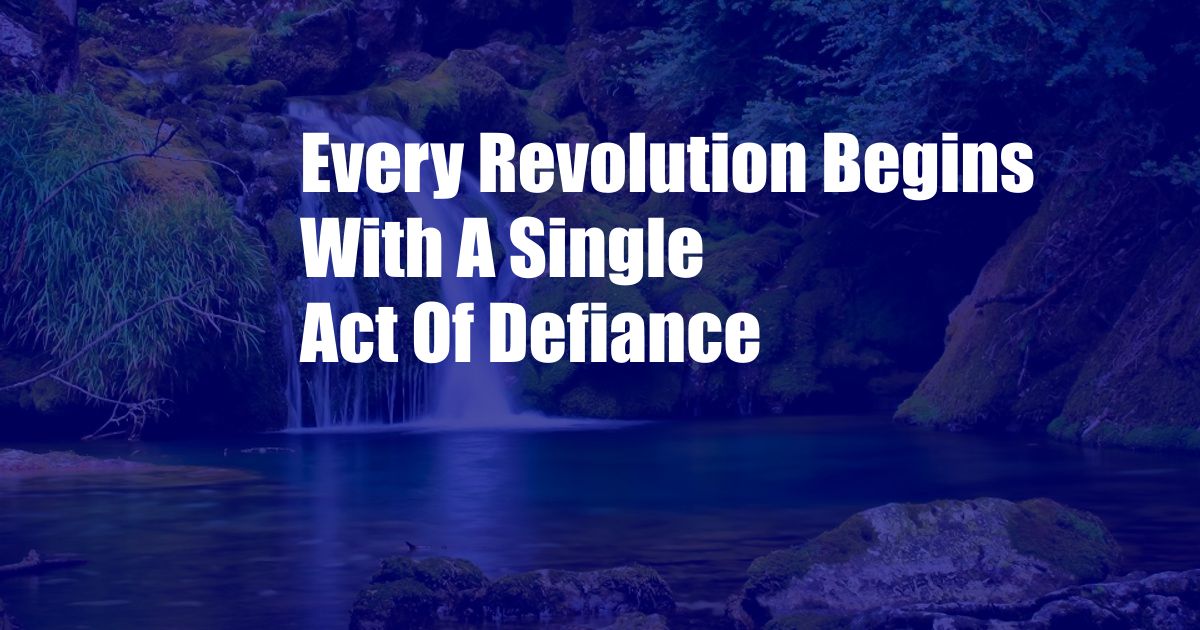
Every Revolution Begins with a Single Act of Defiance
I remember the first time I saw someone standing up to injustice. I was a young girl, and I watched in awe as a woman named Rosa Parks refused to give up her seat on a bus to a white man. Her act of defiance sparked a movement that would change the course of history.
Rosa Parks’ story is just one example of how a single act of defiance can make a difference. Throughout history, revolutions have been sparked by individuals who stood up to tyranny, oppression, and injustice. From the American Revolution to the Civil Rights Movement, every revolution began with a single act of defiance.
The Spark That Lights the Fire
What is it about an act of defiance that can inspire such change? I believe it is because defiance is contagious. When we see someone standing up for what they believe in, it gives us hope. It shows us that we are not alone, and that it is possible to make a difference. It sets off a chain reaction where others join in with confidence and inspire even more to do the same.
Defiance in Action: Understanding the Concept
Defiance involves refusing to comply with unjust or oppressive demands. It can take many forms, from civil disobedience to armed rebellion, but even the smallest and peaceful acts of defiance can have a ripple effect of profound consequences.
In its essence, defiance involves choosing freedom and dignity over conformity and oppression. It signifies a refusal to accept the status quo and a determination to fight for what is right. Whether it’s protesting against unjust laws, standing up to a bully, or simply refusing to be silent in the face of injustice, defiance is a powerful force for change.
Defiance, however, should not be mistaken for mere rebellion or chaos. It is rooted in a commitment to justice and the betterment of society. It is not about causing harm or destruction but rather about creating a more just and equitable world, establishing freedom from oppression, challenging societal norms that perpetuate inequality, and standing up for what is right, no matter how difficult or dangerous.
The Power of Defiance: Its Impact and Significance
History is replete with examples of how acts of defiance can spark revolutions and bring about transformative change. The American Revolution was ignited by the Boston Tea Party, an act of defiance against British taxation. The Civil Rights Movement gained momentum after Rosa Parks’ refusal to give up her bus seat. The fall of the Berlin Wall was preceded by countless acts of defiance from East Germans seeking freedom.
In contemporary times, we continue to witness the power of defiance. The Arab Spring uprisings were sparked by the self-immolation of a Tunisian street vendor, Mohamed Bouazizi, in protest against police harassment. The Me Too movement gained traction after numerous women came forward to share their experiences of sexual harassment and assault. These are just a few examples of how defiance can challenge the status quo, empower individuals, and inspire collective action for positive change.
Expert Advice: Navigating Defiance Wisely
While defiance can be a powerful force for good, it is essential to exercise caution and wisdom when engaging in acts of defiance. Here are some expert tips for navigating defiance effectively:
- Choose your battles wisely: Not all injustices or oppressive demands warrant the same level of response. Consider the potential consequences of your actions and whether it is the most strategic and effective approach.
- Stay nonviolent: Violence often undermines the cause and alienates potential allies. Nonviolent resistance, on the other hand, can be more effective in the long run and garner wider support.
- Build alliances and coalitions: Defiance is often more impactful when it involves collective action. Seek out like-minded individuals and organizations to join forces and amplify your voice.
- Be strategic: Plan your actions carefully, considering the potential risks and rewards. Think about the desired outcomes and how to maximize your chances of success.
- Embrace resilience: Defiance can be met with resistance and setbacks. Stay determined and resilient in the face of challenges, adapting your strategies as needed.
FAQs: Addressing Common Questions
Q: Is defiance always justified?
A: Defiance is justified when it is a response to unjust or oppressive demands, and when it is exercised responsibly and nonviolently.
Q: What are the potential risks of defiance?
A: Defiance can lead to negative consequences, such as arrest, imprisonment, or violence. However, these risks should be weighed against the potential benefits and the importance of standing up for what is right.
Q: How can I make my act of defiance more effective?
A: To increase the effectiveness of your defiance, consider the following: gather support from others, choose the right time and place, plan strategically, and stay nonviolent.
Q: What if my act of defiance fails?
A: Even if your act of defiance does not achieve its immediate goal, it can still inspire others and contribute to a larger movement for change. The important thing is to never give up on your beliefs and to continue fighting for what you believe in.
Conclusion
Every revolution begins with a single act of defiance. When we stand up for what we believe in, we not only inspire others to do the same, but we also create a more just and equitable world. So never be afraid to speak out against injustice, even if it is just a small act. Every act of defiance, no matter how big or small, can make a difference.
Are you ready to be a part of the revolution? What act of defiance will you choose to make?